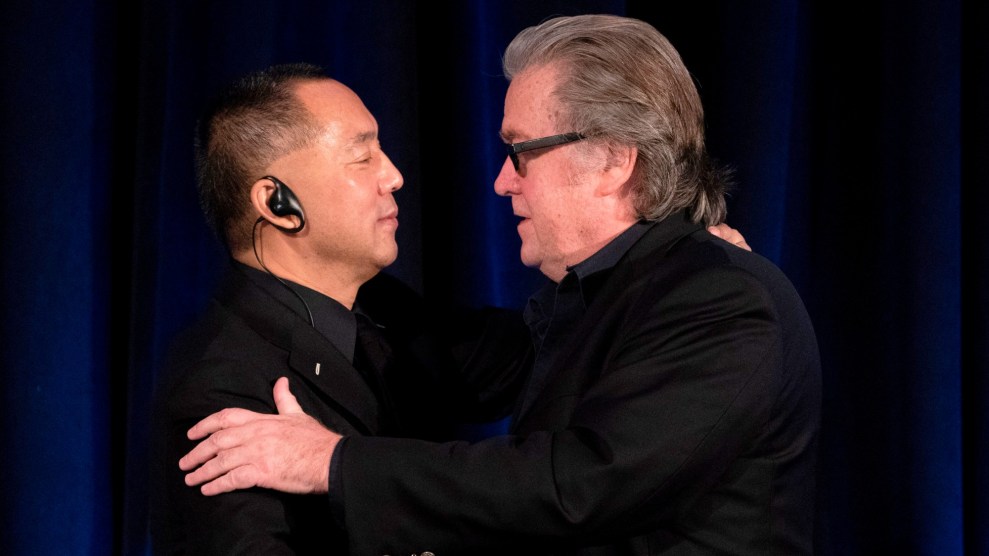
Anthony Behar/Sipa USA
When House Speaker Mike Johnson (R-La.) emerged onto the steps of Columbia University’s Low Memorial Library on Wednesday afternoon, he was greeted with a deafening sound: hundreds of booing students.
Johnson had just emerged from meetings with Jewish students at the university to discuss what he, other Republicans, and some Democrats allege is rising antisemitism on campuses nationwide. Columbia, specifically, has become the epicenter of a politicized fight over the policing of mostly peaceful pro-Palestinian protesters, after CU President Minouche Shafik ordered the NYPD to sweep a Gaza solidarity encampment students set up at the school last Thursday—the day after she testified before a Congressional committee hearing on allegations of antisemitism on campus in the wake of Hamas’ October 7 attack on Israel. Police arrested more than 100 protesters, and NYPD Chief John Chell told the student newspaper, the Columbia Spectator, that “the students that were arrested were peaceful, offered no resistance whatsoever, and were saying what they wanted to say in a peaceful manner.”
But remarks by Johnson and the other Republican politicians he brought to the campus on Wednesday—Rep. Virginia Foxx (R-N.C.), Rep. Nicole Malliotakis (R-N.Y.), Rep. Anthony D’Esposito (R-N.Y.), and Rep. Mike Lawler (R-N.Y.)—painted a very different picture of events, one that an organizer at the encampment said does not represent their ethos.
“Columbia has allowed these lawless agitators and radicals to take over,” Johnson said. He said Jewish students he met with described experiencing “heinous acts of bigotry” on campus, including allegedly being chased down, shouted, and sworn at. (Spokespeople for Columbia didn’t respond to questions from Mother Jones about how many antisemitic or anti-Palestinian incidents they’ve tracked on campus since October 7.)
“Anti-Israel encampments are popping up in universities all across this country,” Johnson continued. “The madness has to stop.”
But as I’ve reported in my tracking of the growing number of Gaza solidarity encampments nationwide, many—including Columbia’s—appear peaceful, with student protesters calling for their universities to divest from companies that fund corporations closely connected to Israel’s military operations, and for administrators to allow pro-Palestinian protesters to peacefully demonstrate without threats of disciplinary action. At Columbia’s encampment—re-established since police cleared it last week—a sign by the entrance clearly lays out their demands: financial divestment from companies and entities that profit from Israel’s war on Gaza; an academic boycott of Israeli institutions; a public statement from the university calling for an immediate and permanent ceasefire; an end to policing on campus; and an end to displacement both in Palestine and around Columbia’s Harlem campus.
Amidst all the campus protests, media coverage and political theatre is how this is whole moment might seem like a distraction from what’s still happening in Gaza.
Here at Columbia, the demands are the first thing you see when walking into the second encampment. pic.twitter.com/fcNDUkRRHW
— Najib | نجيب (@Jib821) April 25, 2024
Sherif Ibrahim, a student and organizer with Columbia University Apartheid Divest, told me inside the encampment organizers believe Republican politicians like Johnson “are getting it completely wrong because they want to get it wrong, and they want to label us as antisemitic when it couldn’t be further from the truth.”
“If you spend time here in the camp, it will be crystal clear to you, but they did not,” he added. “They came and they spoke on the steps, and they left, because it’s a moment to gain political capital, and it’s something that they can make use of because there’s a lot of attention here toward our organizing and toward Columbia.”
Many students who showed up to protest Johnson’s remarks also cast him as an opportunist. They interrupted him throughout his remarks, chanting “free, free Palestine,” and shouting “liar,” “get off our campus,” and “criticism of Israel is not antisemitism.” At one point, when students’ chants of “we can’t hear you” became overwhelming, Johnson paused and smirked before quipping, “enjoy your free speech.”
Protesters chant, "We can't hear you," during Speaker Mike Johnson's news conference at Columbia University on rise of antisemitism on college campuses.
"Enjoy your free speech," Johnson says. https://t.co/8jZBbFvtRO pic.twitter.com/O6qf3I5jg9
— ABC News (@ABC) April 24, 2024
And before he wrapped up his remarks, he relayed a message to the protesters at the encampment outside Butler Library, just across campus: “Go back to class,” Johnson said, “and stop the nonsense.”
When a reporter asked about Johnson’s “message to anti-Zionist Jews inside the camp celebrating Shabbat,” the House speaker replied, “I don’t know who’s in that camp over there, but I will tell you that this is unacceptable.”
At Columbia, after GOP leader Mike Johnson dismisses the hundreds of students protesting, telling them to go back to class, a reporter follows up—
Question: What's your message to anti-Zionist Jews inside the camp celebrating Shabbat?
Mike Johnson: I don't know who's in that camp pic.twitter.com/iHQGz4ccpP— Prem Thakker (@prem_thakker) April 24, 2024
Ben Gelman, a Jewish student at Columbia Law School I met outside Low Library after Johnson left, seemed to be a rarity among the students who came to hear Johnson speak: He told me he was glad the politicians showed up. Gelman said he was in an earlier meeting with Johnson, and that the Speaker told students “he’s going to work tirelessly to make sure that Jews can feel safe at Columbia again, that we aren’t intimidated.”
I asked Gelman if he experienced antisemitism firsthand at Columbia, and he referred to a video that has circulated on social media showing some protesters outside Columbia’s gates chanting, “burn Tel Aviv to the ground” and “Hamas, we love you, we support your rockets too.”
“I actually hold Israeli citizenship, and for people telling me that a country that I’m a citizen of should get burned down—that was not comfortable at all, and quite frankly, it shocked and angered me,” Gelman told me.
When I headed to the encampment a bit later and met Ibrahim, one of the organizers, he told me he hadn’t seen the video Gelman referred to, and said, “To all these critiques, we say there’s a definitive, declarative difference between anti-Zionism and antisemitism, and we oppose discrimination of all forms and all kinds vehemently.”
Inside the encampment, things were peaceful and orderly: entry was tightly controlled, and students were sitting outside tents, eating and working on their laptops. Tables of food were set up in one corner of the camp, and as I milled around with a colleague, students began laying down blue tarps on the grass so Muslim students could pray. Ibrahim also mentioned that the camp hosted a Passover Seder a few nights ago.
Yesterday, Shafik emailed students saying that they had to clear the encampment by midnight or face “alternative options for clearing the West Lawn,” prompting many protesters to fear the police would return. Shortly after midnight, organizers said administrators extended the deadline to 4 a.m., and this morning, administrators said they were having “constructive dialogue” with encampment organizers and would extend the deadline to disperse by another 48 hours.
One student I met outside the Low Library after Johnson’s speech, who only identified himself by an initial, K, summed up the dissonance between Johnson’s description of the protesters and the reality of the encampment: “It’s as if there’s some kind of armed insurrection here—there isn’t,” K told me. “There’s maybe, like, 100 students sleeping in tents on a lawn.”















